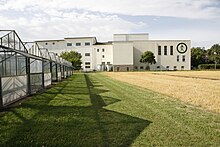Strube D&S
| Strube D&S GmbH
|
|
|---|---|
| legal form | GmbH |
| founding | 1877 |
| Seat | Headquarters: Söllingen, Lower Saxony
Second seat: Schlanstedt, Saxony-Anhalt |
| management | Eric Verjux, Martin Reisige, Christian Knolle |
| Number of employees | 420 |
| Branch | Agriculture - seed farming |
| Website | https://www.strube.net/deutschland/ |
The Strube D & S GmbH is a traditional, medium-sized company in the field of plant breeding , based in Söllingen in northern Harz region. The company's second headquarters are located 20 kilometers away in Schlanstedt , Saxony-Anhalt. The international company develops, produces and sells seeds for agriculture and industry. Strube is currently active in over 30 countries. The breeding and marketing of sugar beet is part of the plant breeder's core business - around 70 percent of annual sales, which most recently amounted to 80 million euros, come from this area.
The Strube Group also includes Strube Research GmbH & Co. KG, which concentrates the research and development activities of Strube D&S. With Strube Research, the company is a member of the Federal Association of German Plant Breeders and a co-founder and partner of the Saaten Union .
history
In 1877, the farmer Friedrich Strube began in Schlanstedt, Saxony-Anhalt, with the selective breeding of sugar beets, peas and wheat . In addition to the elite breeding that was customary at the time, he was one of the first German breeders to use artificial crossings. The resulting varieties brought significant improvements in yield, but also stability and other agriculturally important properties compared to the so-called land varieties previously grown in the fields.
Friedrich Strube thus laid the foundation stone for the plant breeding company. After the end of the Second World War, due to the expropriation of the headquarters in Schlanstedt, the company relocated to the palace domain in Schöningen, Lower Saxony. The breeding work that had been carried out since 1877 was actively continued here. Around 10 years after the end of the war, Strube bought the disused sugar factory in Söllingen in 1957 in order to expand its breeding work there. Some time later, the company completely relocated its headquarters to the former sugar factory. The company's headquarters are still in Söllingen today. After the reunification of Germany, the seed company was able to buy back parts of the headquarters in Schlanstedt in 1992.
The family-run company was sold on April 1, 2018. The new owners are Deleplanque & Cie from France with 60 percent and SUET Saat- und Erntetechnik from Eschwege with 40 percent. Since then, the new owners have continued the activities of Strube as before.
Products
The company grows sugar beet and wheat crops. The product portfolio in addition include the crops Sunflower , edible pea and sweet corn . The varieties are sold worldwide directly or through subsidiaries, representative offices and commercial agents.
Research and Development
Strube Research GmbH & Co. KG, part of the Strube group of companies, concentrates the research and development activities of Strube D&S. Using traditional breeding and plant biotechnology methods, Strube Research is developing and increasing varieties of sugar beet and wheat. Among other things, double haploid production, development and application of molecular markers, genetic mapping and association analysis, sequence analysis and protein analysis are used.
The company works in various collaborations with various partners, such as universities and institutes, and participates in numerous research projects and specialist articles on the sugar beet and wheat crops.
The company develops u. a. together with the Austrian Institute of Technology (AIT) , the Agrana Research & Innovation Center and the Leibniz Institute for Plant Genetics and Crop Plant Research (IPK) molecular markers to characterize the shelf life of sugar beet varieties . Strube is also currently participating in the investigations of the Julius Kühn Institute - Federal Research Institute for Cultivated Plants on the subject of crop protection: with its participation in "GetreideProtekt", strategies for protecting grain against the increasing fungal diseases caused by the climate are to be developed.
Web links
- Literature from and about Strube D&S in the bibliographic database WorldCat
- Website
Individual evidence
- ↑ Dieter Kunze, Volksstimme Magdeburg: Schlanstedter research for the beet seed. Retrieved March 5, 2020 .
- ↑ Strube D&S GmbH: History :: Strube. The seed. Since 1877. Retrieved March 5, 2020 .
- ↑ Strube D&S GmbH: About Us :: Strube. The seed. Since 1877. Retrieved March 5, 2020 .
- ↑ High investments for strong growth. Retrieved March 5, 2020 .
- ↑ a b Strube D&S GmbH: Research :: Strube. The seed. Since 1877. Retrieved March 5, 2020 .
- ^ Strube research GmbH & Co. KG. Federal Association of German Plant Breeders V., accessed on March 5, 2020 .
- ↑ About us. Retrieved March 5, 2020 .
- ↑ Strube, Friedrich. Retrieved March 5, 2020 .
- ^ A b Helmstedter Nachrichten, Helmstedt Germany: The sugar beets of the future will grow in Söllingen. March 12, 2019, accessed March 5, 2020 .
- ↑ Strube D&S GmbH: History :: Strube. The seed. Since 1877. Retrieved March 5, 2020 .
- ↑ agro today Klaus Strotmann: family Strube is sold. April 4, 2018, accessed March 5, 2020 .
- ↑ Strube D&S GmbH: Company :: Strube. The seed. Since 1877. Retrieved March 5, 2020 .
- ↑ biotechnologie.de. Retrieved March 5, 2020 .
- ^ Google Scholar. Retrieved March 5, 2020 .
- ^ Result for 'Strube Saatzucht'. WorldCat.org, accessed March 5, 2020 .
- ↑ Pflanzenforschung.de: Functional genome research on flowering genes for the targeted genetic modification of the flowering time in sugar beet. Retrieved March 5, 2020 .
- ↑ Journal for Cultivated Plants, 65 (12). Pp. 490-494, 2013, ISSN 1867-0911, Verlag Eugen Ulmer KG, Stuttgart. Retrieved March 5, 2020 .
- ↑ Home. Retrieved March 5, 2020 .
- ↑ GrainProtect . Retrieved March 5, 2020 .


